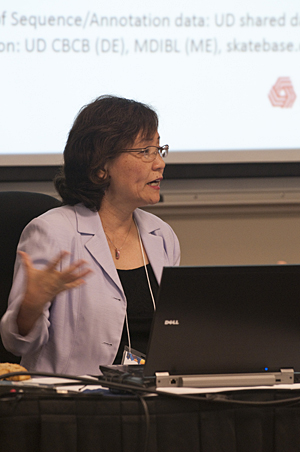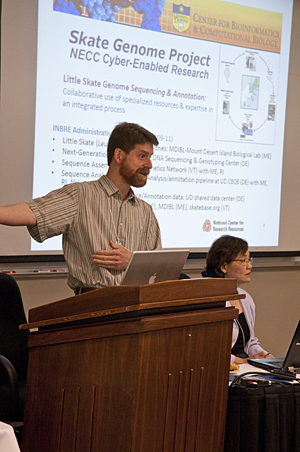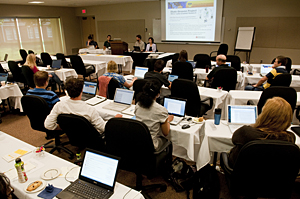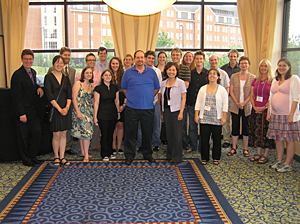


ADVERTISEMENT
- Rozovsky wins prestigious NSF Early Career Award
- UD students meet alumni, experience 'closing bell' at NYSE
- Newark Police seek assistance in identifying suspects in robbery
- Rivlin says bipartisan budget action, stronger budget rules key to reversing debt
- Stink bugs shouldn't pose problem until late summer
- Gao to honor Placido Domingo in Washington performance
- Adopt-A-Highway project keeps Lewes road clean
- WVUD's Radiothon fundraiser runs April 1-10
- W.D. Snodgrass Symposium to honor Pulitzer winner
- New guide helps cancer patients manage symptoms
- UD in the News, March 25, 2011
- For the Record, March 25, 2011
- Public opinion expert discusses world views of U.S. in Global Agenda series
- Congressional delegation, dean laud Center for Community Research and Service program
- Center for Political Communication sets symposium on politics, entertainment
- Students work to raise funds, awareness of domestic violence
- Equestrian team wins regional championship in Western riding
- Markell, Harker stress importance of agriculture to Delaware's economy
- Carol A. Ammon MBA Case Competition winners announced
- Prof presents blood-clotting studies at Gordon Research Conference
- Sexual Assault Awareness Month events, programs announced
- Stay connected with Sea Grant, CEOE e-newsletter
- A message to UD regarding the tragedy in Japan
- More News >>
- March 31-May 14: REP stages Neil Simon's 'The Good Doctor'
- April 2: Newark plans annual 'wine and dine'
- April 5: Expert perspective on U.S. health care
- April 5: Comedian Ace Guillen to visit Scrounge
- April 6, May 4: School of Nursing sponsors research lecture series
- April 6-May 4: Confucius Institute presents Chinese Film Series on Wednesdays
- April 6: IPCC's Pachauri to discuss sustainable development in DENIN Dialogue Series
- April 7: 'WVUDstock' radiothon concert announced
- April 8: English Language Institute presents 'Arts in Translation'
- April 9: Green and Healthy Living Expo planned at The Bob
- April 9: Center for Political Communication to host Onion editor
- April 10: Alumni Easter Egg-stravaganza planned
- April 11: CDS session to focus on visual assistive technologies
- April 12: T.J. Stiles to speak at UDLA annual dinner
- April 15, 16: Annual UD push lawnmower tune-up scheduled
- April 15, 16: Master Players series presents iMusic 4, China Magpie
- April 15, 16: Delaware Symphony, UD chorus to perform Mahler work
- April 18: Former NFL Coach Bill Cowher featured in UD Speaks
- April 21-24: Sesame Street Live brings Elmo and friends to The Bob
- April 30: Save the date for Ag Day 2011 at UD
- April 30: Symposium to consider 'Frontiers at the Chemistry-Biology Interface'
- April 30-May 1: Relay for Life set at Delaware Field House
- May 4: Delaware Membrane Protein Symposium announced
- May 5: Northwestern University's Leon Keer to deliver Kerr lecture
- May 7: Women's volleyball team to host second annual Spring Fling
- Through May 3: SPPA announces speakers for 10th annual lecture series
- Through May 4: Global Agenda sees U.S. through others' eyes; World Bank president to speak
- Through May 4: 'Research on Race, Ethnicity, Culture' topic of series
- Through May 9: Black American Studies announces lecture series
- Through May 11: 'Challenges in Jewish Culture' lecture series announced
- Through May 11: Area Studies research featured in speaker series
- Through June 5: 'Andy Warhol: Behind the Camera' on view in Old College Gallery
- Through July 15: 'Bodyscapes' on view at Mechanical Hall Gallery
- More What's Happening >>
- UD calendar >>
- Middle States evaluation team on campus April 5
- Phipps named HR Liaison of the Quarter
- Senior wins iPad for participating in assessment study
- April 19: Procurement Services schedules information sessions
- UD Bookstore announces spring break hours
- HealthyU Wellness Program encourages employees to 'Step into Spring'
- April 8-29: Faculty roundtable series considers student engagement
- GRE is changing; learn more at April 15 info session
- April 30: UD Evening with Blue Rocks set for employees
- Morris Library to be open 24/7 during final exams
- More Campus FYI >>
1:28 p.m., June 1, 2010----The Center for Bioinformatics and Computational Biology (CBCB) at the University of Delaware hosted the first Skate Genome Annotation Workshop at Clayton Hall from May 24-28.
The five-day, hands-on bioinformatics workshop was sponsored by the Northeast Cyberinfrastructure Consortium (NECC), which is aimed at developing cyberinfrastructure across New Hampshire, Maine, Rhode Island, Vermont, and Delaware and using this broadband network for cyber-enabled research programs.
The workshop, which drew 27 participants and 10 instructors from universities and colleges in the NECC states, was the first of three bioinformatics workshops planned to annotate the genome of the little skate, Leucoraja erinacea.
The skate is one of 11 strategically selected non-mammalian organisms determined by a National Human Genome Research Institute panel to have the greatest potential to fill crucial gaps in human biomedical knowledge. Each of the chosen species represents a position on the evolutionary timeline marked by important innovations in animal anatomy, physiology, development, or behavior.
“This workshop was the inaugural event of a two-year effort to sequence and annotate the skate genome,” said Cathy Wu, Edward G. Jefferson Chair of Bioinformatics and Computational Biology at UD and chair of the workshop.
“We receive DNA samples from our colleagues in Maine; sequence them at the Delaware Biotechnology Institute; organize and store the data at regional data centers in Delaware, Maine, and Vermont; and then work with our colleagues in New England on the analysis and annotation. I'm delighted that we were able to host this group of students and instructors at the University of Delaware.”
David Landsman, chief of the Computational Biology Branch for NIH's National Center for Biotechnology Information at the National Library of Medicine, delivered the keynote address on Thursday night. Landsman, who also serves as a member of the External Advisory Board of the Delaware INBRE, spoke about the dramatic increase in sequencing and other data generated on a daily basis and the technological and scientific challenges and opportunities that come with this “data tsunami.”
“There is again a need for training a new brand of scientists who are both expert experimentalists and computationally savvy,” he said.
As part of the workshop agenda, participants had the opportunity to visit DBI's DNA Sequencing and Genotyping Center, where center director Brewster Kingham provided hands-on demonstrations of the high-throughput sequencing capabilities of the Illumina Genome Analyzer.
“The collaborative sequencing and annotation of the skate genome is an ideal project for us to explore and test the capabilities of our growing network,” said Karl Steiner, senior associate provost for research development at UD and principal investigator of the Delaware INBRE (IDeA Networks of Biomedical Research) grant funded by the National Institutes of Health, which provided support for the workshop through administrative supplements to the INBRE programs in the five participating states. Steiner is also principal investigator on an EPSCoR Track-2 award funded by the National Science Foundation to further enhance the NECC cyberinfrastructure initiative. Both of these programs provide complementary support to build critical research infrastructure at UD and across Delaware.
The participants were selected from a pool of more than 50 applicants to receive travel awards from the INBRE administrative supplement to attend the workshop.
“I feel that this workshop has opened my eyes to the field of bioinformatics and inspired me to look further into what it is all about, possibly exploring it as a career,” said one participant.
“I started this week knowing nearly nothing about bioinformatics,” said another, “but now I'm confident that I'll be able to fill in the gaps in my knowledge well enough to work effectively -- the door has been opened, so to speak.”
The workshop tutorials are available online at the CBCB website for students and researchers who are interested in learning more about genome annotation.
Article by Diane Kukich
Photos by Doug Baker



